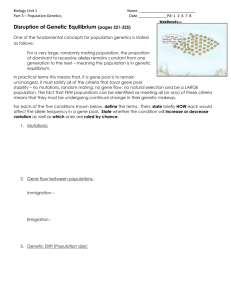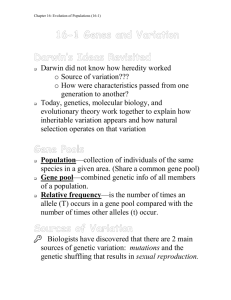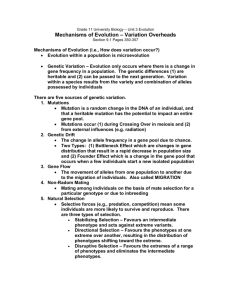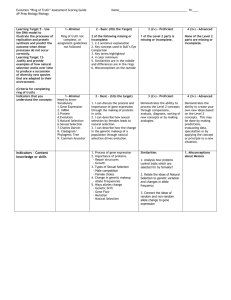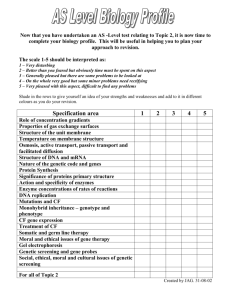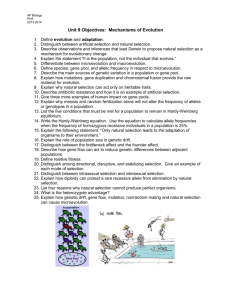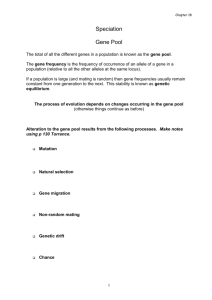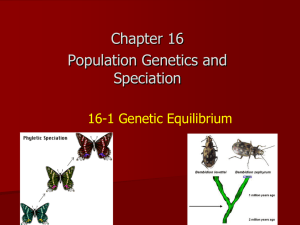Level 2 BIOLOGY 2.3 AS 90459 version 2 Evolution Support
advertisement
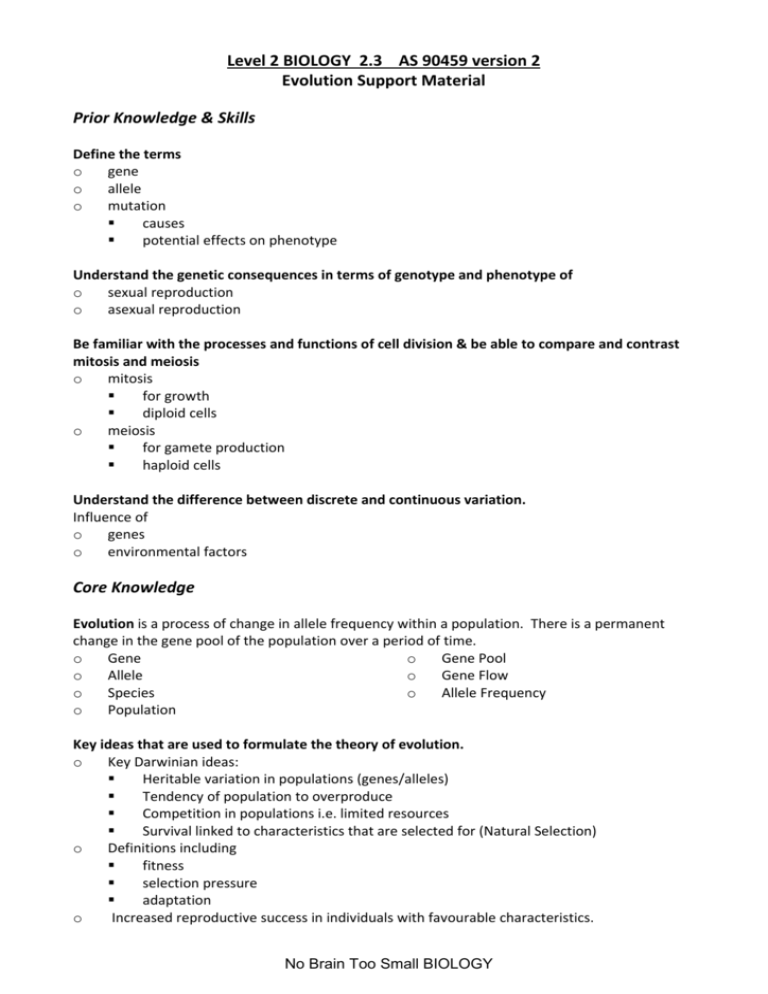
Level 2 BIOLOGY 2.3 AS 90459 version 2 Evolution Support Material Prior Knowledge & Skills Define the terms o gene o allele o mutation causes potential effects on phenotype Understand the genetic consequences in terms of genotype and phenotype of o sexual reproduction o asexual reproduction Be familiar with the processes and functions of cell division & be able to compare and contrast mitosis and meiosis o mitosis for growth diploid cells o meiosis for gamete production haploid cells Understand the difference between discrete and continuous variation. Influence of o genes o environmental factors Core Knowledge Evolution is a process of change in allele frequency within a population. There is a permanent change in the gene pool of the population over a period of time. o Gene o Gene Pool o Allele o Gene Flow o Species o Allele Frequency o Population Key ideas that are used to formulate the theory of evolution. o Key Darwinian ideas: Heritable variation in populations (genes/alleles) Tendency of population to overproduce Competition in populations i.e. limited resources Survival linked to characteristics that are selected for (Natural Selection) o Definitions including fitness selection pressure adaptation o Increased reproductive success in individuals with favourable characteristics. No Brain Too Small BIOLOGY Sources of variation in a gene pool. Genetic variation as a result of: o sexual reproduction (meiosis) crossing over independent assortment o mutation Factors that lead to change in a gene pool. Define Genetic Equilibrium. o Factors identified as immigration; mutation; natural selection; population size; genetic drift; mate selection environmental variation leading to selection. o Basic concept of barriers to gene flow e.g. geographic, potentially leading to biological isolation and speciation. Natural selection and the different types o Natural Selection: Survival and differential reproductive success in individuals whose characteristics are best suited to the environment at a given time. Stabilising ‐ favours middle range of adaptive phenotype Directional – favours one extreme of adaptive phenotype Disruptive – Favours both extremes of adaptive phenotype Genetic change; o Genetic drift, the founder effect and the bottleneck effect. Genetic Drift: random change in allele frequency OR chance loss of alleles from gene pool; most pronounced in small population Bottleneck: severe reduction in gene pool diversity, followed by recovery of a population Founder: development of a population from a small number of individuals with a limited gene pool o Causes/consequences of genetic drift, founder effect and the bottleneck effect in relation to genetic biodiversity Reasons for genetic variation and change Different selection pressures produce a change in allele frequency in the local gene pool, due to changed reproductive success of individuals with particular genotype. If two populations are isolated i.e. no gene flow, and there are different selection pressures then the allele frequencies in each gene pool will diverge. Reasoning includes an explanation of survival of the fittest as appropriate to two different environments. Supplementary knowledge Define artificial selection. o Describe the basis of the principles of artificial selection and link to human needs or demands. No Brain Too Small BIOLOGY o Including both traditional and modern biotechnological techniques (e.g. in vitro fertilisation, pre‐implantation genetic analysis). Describe evidence for evolution o Simple description of evidence presented – detail of each form not required) biogeography, the fossil record, comparative anatomy, comparative embryology, molecular biology observed evolution (e.g. bacterial resistance etc). o Linked to how it supports theory of evolution. Key Words These are the words that you are expected to understand when used in questions and be able to use in your answers Mutation Core Vocabulary Natural selection Adaptation Phenotype Allele Population Allele frequency Recombination Bottle neck effect Selection pressure Directional selection Speciation Disruptive selection Species Evolution Stabilising selection Founder effect Variation Gene Gene pool Supplementary Vocabulary Gene flow Artificial selection Gene frequency Biogeography Genetic drift Comparative anatomy Genetic equilibrium Comparative embryology Genotype Fossil Immigration Molecular biology Independent assortment Pentadactyl limb Mate selection Vestigial organs Meiosis Mitosis No Brain Too Small BIOLOGY
